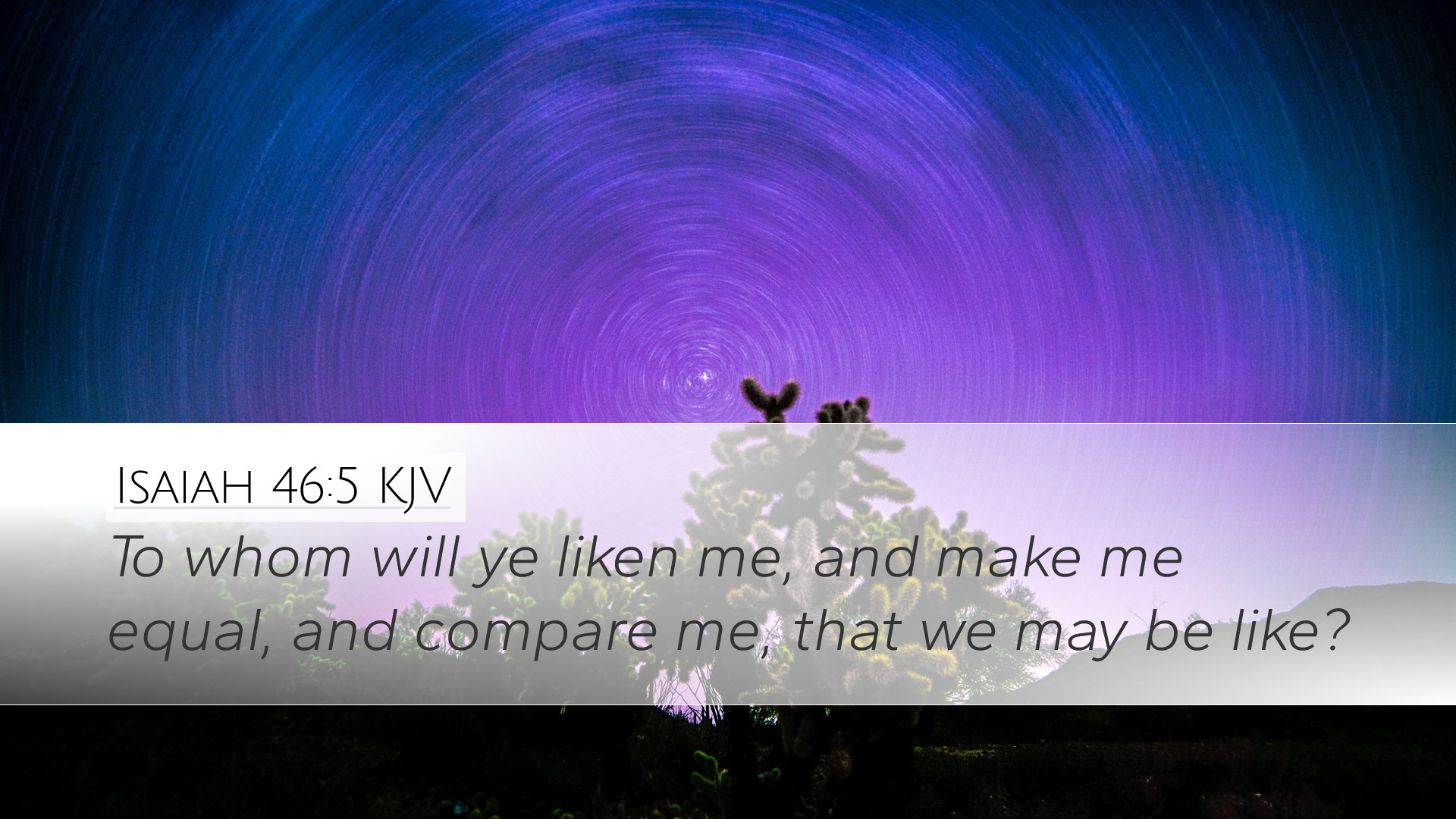Commentary on Isaiah 46:5
Isaiah 46:5 states: "To whom will you liken me and make me equal, and compare me, that we may be alike?" This verse encapsulates the themes of God's uniqueness and supremacy over all other so-called deities and idols. It challenges readers to contemplate the distinct and incomparable nature of the Lord, which is a critical understanding for pastors, students, theologians, and Bible scholars alike.
Contextual Overview
In the context of the Book of Isaiah, this verse comes during a period when Israel faced significant threats from surrounding nations and a temptation to rely on foreign gods. The Lord, through the prophet Isaiah, emphasizes His sovereignty and the foolishness of idolatry.
Theological Significance
Theological reflections on Isaiah 46:5 reveal several critical insights:
- The Uniqueness of God: God asks, "To whom will you liken me?" This rhetorical question highlights that there is no one comparable to the Lord. As noted by Matthew Henry, the statement asserts God's absolute sovereignty over all creation.
- Idolatry Exposed: Albert Barnes reflects on how this verse serves as a condemnation of the idols that were prevalent in Isaiah's time. The idols were man-made and powerless, which contrasted starkly with the living God.
- Call to Recognition: Adam Clarke emphasizes that this is an invitation to recognize God's authority. It encourages believers to understand that no object or being can hold the same power and authority as God, urging a reassessment of what they consider worthy of reverence.
Historical and Cultural Context
Understanding the historical and cultural context of this verse is vital:
- The ancient Near Eastern world was rife with polytheism, where nations worshiped multiple gods often represented by idols. This context sheds light on the importance of Isaiah's message, which was transformative for Israel.
- Idols were often associated with various aspects of life—agriculture, war, fertility—and were thought to be capable of providing prosperity and protection. God’s assertion against these idols calls Israel to a higher understanding of dependence on the Creator rather than created things.
Exegesis and Linguistic Analysis
A closer examination of the original Hebrew terms used in Isaiah 46:5 further clarifies the text's meaning:
- “Liken” (דָּמוּת - damuth): This term expresses the action of making something resemble another. It underscores that no likeness can be made of God.
- “Equal” (שָׁוֶה - shavé): This suggests an equality or commensurateness, emphasizing that no one is equal to God in nature or attributes.
- “Compare” (יָשִׁיב - yashiv): The call to compare serves as a challenge to the audience, highlighting the absurdity of trying to find a comparison for God among idols.
Application for Today
For contemporary believers, Isaiah 46:5 carries vital implications:
- Understanding Identity: In a world filled with distractions and competing ideologies, students and believers are urged to reflect on their true source of worth and identity, which is found solely in God.
- Anti-idolatry Message: Pastors can utilize this verse to confront modern-day idols—materialism, success, and self—as clear parallels to the historical context of ancient Israel.
- Encouragement in Trials: The verse offers comfort that despite the challenges believers face, they serve a God who is unparalleled and omnipotent, reminding scholars and leaders of God's faithful presence.
Conclusion
Isaiah 46:5 is a profound reminder of the absolute uniqueness of God. By comparing and contrasting Him with other entities, this verse serves not only as a challenge to those who may be inclined toward idolatry but also as an exhortation for believers to deepen their understanding and devotion to the one true God. The insights from public domain commentaries enrich our understanding and application of this timeless truth.


